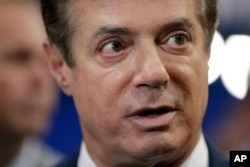The U.S. Department of Justice says it needs Congress to grant it the authority to demand information that would disclose if people are lobbying on behalf of foreign governments.
In a report issued Wednesday, the Justice Department’s inspector general said confusion over how to enforce existing laws has led to widespread late registrations and required updates by U.S. lobbyists. This has triggered controversy around Paul Manafort, the former campaign chairman to Republican presidential nominee Donald Trump.
Manafort and his lobbying firm did not register their activities for a European research institution as required by the Foreign Agents Registration Act of 1938 (FARA). Manafort surreptitiously ran the institution with the help of an associate who worked for a Russian-backed political party in Ukraine.
"The Justice Department has long viewed itself as being not a disclosure agency," Craig Holman, government affairs lobbyist for Public Citizen, a non-profit citizens advocate group, told VOA. "It operates essentially in secrecy and it does not appreciate having the responsibility of trying to enforce disclosure laws."
Despite the existence of FARA, which governs the activities of foreign lobbyists, the inspector general's report noted only seven prosecutions since 1993 and that registrations have dropped sharply over the decades.
Virginia Commonwealth University professor Jason Arnold, author of Secrecy in the Sunshine Era: The Promise and Failures of U.S. Open Government Laws, told VOA the report's findings reinforce earlier evidence of decling registrations and enforcement. "In order to prevent lobbying firms from exploiting what they see as loopholes in how FARA is enforced, Congress should make the registration requirements and non-compliance punishments even more explicit. Congress should also work with the [Justice Department] to deliver more resources to the understaffed FARA enforcement office."
Violations of the law are punishable by up to five years in prison, but the report said Justice Department investigators and attorneys have had different opinions over the years on what constitutes a case eligible for prosecution. They also confused FARA with another law, the Lobbying Disclosure Act, which imposes less stringent requirements.
Department of Justice records inspectors said they were understaffed and currently search newspaper articles to get leads on illegal activities of foreign lobbyists.
Holman agrees Congress should intervene because he said the laws do not give the department the authority to issue subpoenas without the ability to prove criminal intent. "If Congress were to amend the lobby disclosure laws, giving the Department of Justice its own subpoena authority so it could go ahead and conduct investigations without having to formally press criminal charges first, that would be a phenomenal assistance for the Department of Justice to carry through with its investigations."
The report concluded that the Justice Department needs a better system to track missing records. And Holman, like Arnold, agreed more resources are needed at the agency. "If we could get just a dozen enforcement actions coming out of the Department of Justice, that would give a signal to lobbyists across the board that they’d better beware," Holman said.











